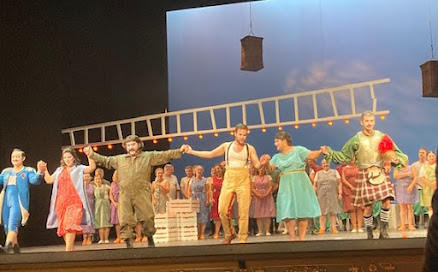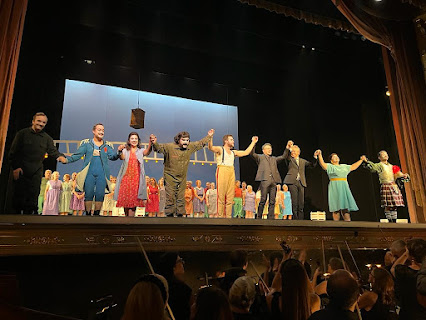(review in English below)
A ópera L’Elisir d’Amore de G Donizetti abriu a temporada lírica do Teatro de São Carlos. Uma produção nova com encenação e cenografia de Mário João Alves.
Duas escadas, umas mesas, cestos e caixas com (muitas) laranjas e pouco mais foram os adereços usados. A encenação foi simples mas com várias partes interessantes e de bom efeito visual, tendo tonado o espectáculo agradável de ver.
Passa-se num ambiente rural, numa quinta de produção de laranjas ou similar. Antes da sua chegada (de pára-quedas) o Dr. Dulcamara lança panfletos sobre a plateia a anunciar as suas façanhas.
No final são também lançados sobre a plateia enormes balões simulando laranjas.
O maestro Antonio Pirolli ofereceu-nos uma boa orquestração, mas por vezes pouco viva. A Orquestra Sinfónica Portuguesa esteve muito bem. Destaco o fagote (David Harrison) e a harpa (Carmen Cardeal) na famosíssima aria Una furtiva lagrima.
Os solistas eram todos jovens, o que é óptimo, mas as interpretações não foram ao mesmo nível. O Nemorino foi interpretado pelo tenor espanhol Antonio Garés. Tem uma boa figura mas a emissão foi irregular, alternando períodos em que era bem audível com outros que mal se ouvia. O timbre é peculiar e, no registo mais agudo, parece cantar em falsete.
O barítono Ricardo Panela, cantor que muito aprecio, foi um Belcore vocalmente correcto, mas a figura não se ajusta à personagem. É demasiado jovem e franzino para o papel do sargento. A encenação e o guarda-roupa também não ajudaram.
O melhor da tarde foi o o baixo chileno Ricardo Seguel como Dulcamara. Tem uma voz poderosa, sempre bem audível, timbre muito bonito e em cena foi o mais credível.
A Giannetta cantada por Joana Seara foi uma presença agradável.
***
L'ELISIR D'AMORE, Teatro de São Carlos, October 2022
The opera L'Elisir d'Amore by G Donizetti opened the lyrical season at Teatro de São Carlos. A new production with production and staging by Mário João Alves.
Two ladders, some tables, and baskets and boxes with (many) oranges were the props used. The staging was pleasant, had several interesting parts and good visual effect, making the performance pleasant to watch. It takes place in a rural setting, on an orange farm or similar. Before his arrival (by parachute) Dr. Dulcamara throws pamphlets over the audience announcing her achievements. At the end, huge balloons simulating oranges are also thrown over the audience.
Maestro Antonio Pirolli offered us a good orchestration, but sometimes not very lively, and the Orquestra Sinfónica Portuguesa played very well. I highlight the bassoon (David Harrison) and the harp (Carmen Cardeal) in the very famous aria Una furtiva lagrima. The São Carlos Theater Choir, under the direction of Giampaolo Vesselia, had an excellent performance.
The soloists were all young, which is great, but the performances weren't on the same level. Nemorino was interpreted by Spanish tenor Antonio Garés. He has a good figure but the vocal emission was irregular, alternating periods in which he was very audible with others that were barely audible. The timbre is peculiar and, in the highest register, he seems to sing in falsetto.
Soprano Rita Marques was Adina, who did not start well but improved throughout the performance and at the end of the 2nd act she had a remarkable performance, with a secure and in tune high register. On stage, she didn't show any attraction for either Belcore or Nemorino, a similar situation on their part as well.
Baritone Ricardo Panela, a singer I really appreciate, was a vocally correct Belcore, but the figure of the singer doesn't fit the character. He's too young and skinny for the role of sergeant. The staging and clothes didn't help either.
The best singer of the afternoon was the Chilean bass Ricardo Seguil as Dulcamara. He has a powerful voice, always very audible, very beautiful timbre and scenically he was the most credible.
Giannetta sung by Joana Seara was a pleasant presence.
***
























Mais do mesmo no São Carlos. As coisas não mudam. Os elencos pobrezinhos... etc etc. Tudo muito provinciano. Fico sem vontade de lá ir.
ResponderEliminar